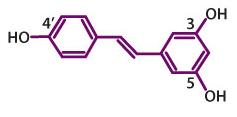What is Resveratrol?

Resveratrol is a polyphenolic compound found naturally in grapes, red wine, peanuts, blueberries, bilberries, cranberries, and other plants to help protect from bacteria and fungi. One of the most significant plants that reseveratrol is found in is Polygonum cuspidatum, also known as Japanese knotweed, a plant that has been used for centuries in Asia to treat heart and liver disorders. Resveratrol occurs in two forms, cis and trans resveratrol, the "trans" isomer is the beneficial substance that is biologically active.
Resveratrol History & Research
In 1940, resveratrol was identified in the roots of a Japanese plant called white hellebore (Veratrum grandiflorum O. Loes) by Takaoka.
In 1963, resveratrol was identified in the roots of a traditional Chinese and Japanese medicinal plant called Japanese knotweed. The Japanese knotweed is also known as ko-jo-kon in Japanese or Polygonum cuspidatum in Latin. It has been used to treat a wide range of afflictions, including fungal infections, various skin inflammations, and liver and cardiovascular diseases.
In 1992, resveratrol came to scientific attention when Dr. Serge Renaud coined the phrase "French Paradox". It has been observed that the French suffer a relatively low incidence of coronary heart disease despite having a diet relatively rich in saturated fats. This led to research indicating that regular consumption of red wine might provide additional protection from cardiovascular disease.
In 2003, David Sinclair at the Harvard Medical School and Howitz at BIOMOL Research Laboratories, Inc., found that resveratrol can improve the life span of yeast cells by as much as 70%. In the next year, they determined that worms and flies lived nearly 30 percent longer and fish lived almost 60 percent longer.
In 2006, a team of researchers led by David Sinclair and Joseph Baur at the Harvard Medical School and by Rafael de Cabo at the National Institute on Aging
published an article in the online journal Nature. Resveratrol improves health and survival of mice on a high-calorie diet.
They reported that a natural substance found in red wine, known as resveratrol, may offset the bad effects of a high-calorie diet in mice, including
lowering the rate of diabetes, liver problems, and significantly extending their lifespan. Fat-related deaths dropped 31 percent for obese mice on the supplement,
compared to fat mice that got no treatment.
Read about the Harvard Medical School research.
In 2009, a team of researchers at the Glasgow Biomedical Research Centre in Scotland reported in The FASEB Journal resveratrol may stop inflammation with a one-two punch by preventing two molecules sphingosine kinase and phospholipase D, known to trigger inflammation.
Now that we have taken a look at Resveratrol's history, and some of the major research findings, let's take a closer look at why Resveratrol is receiving so much attention.
Learn more about the Health Benefits of Resveratrol.
Perfect ResGrape Articles
» Resveratrol History & Research» Resveratrol Health Benefits
» Resveratrol Side Effects
» Resveratrol Dosage
» Resveratrol in the Media
» Muscadine Grapes
